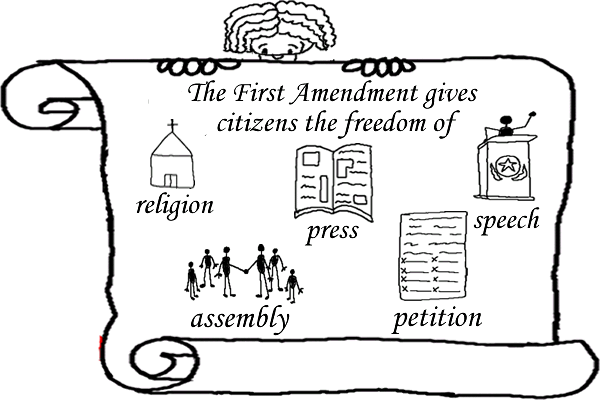
The separation of church and state is a controversial philosophy that aims to keep the government out of religion.
#FREEDOM OF RELIGION AMENDMENT FREE#
This free exercise of religion establishes the separation of church and state - not necessarily in the First Amendment’s text (the term came from a Thomas Jefferson letter), but certainly in numerous judicial interpretations over the years. (We discuss “ceremonial deism” below.) Religious freedom also does not allow someone to exercise their religion insomuch as it infringes on another’s freedoms. This freedom does not remove all mention of God from government property or government-endorsed speech.

“ Congress shall make no law respecting an establishment of religion, or prohibiting the free exercise thereof or abridging the freedom of speech, or of the press or the right of the people peaceably to assemble, and to petition the Government for a redress of grievances.”
Citizens may freely exercise their beliefs in whatever religion they choose. The government is not allowed to declare a state religion. In the United States, the right to freedom of religion refers to two things: What is the right to freedom of religion? Looking for both sides of the argument? Sign up for our free email newsletter to hear both sides of hot-topic arguments. For instance, 45% of Americans want America to be a “Christian nation.” However, over half of those individuals also say the federal government should never endorse or declare any official religion. Religion is baked into the foundations of the United States. Few argue against the freedom of religion in general, but there are many arguments about certain aspects of this freedom. Constitutional rights must apply to even the most unpopular groups if they’re going to be preserved for everyone.Freedom of religion (or religious liberty) is a fundamental right enshrined in the Bill of Rights of the US Constitution. That’s because the defense of freedom of speech is most necessary when the message is one most people find repulsive. We have defended the speech rights of communists, Nazis, Ku Klux Klan members, accused terrorists, pornographers, anti-LGBT activists, and flag burners. Over the years, the ACLU has frequently represented or defended individuals engaged in some truly offensive speech. The ACLU is always on guard to ensure that the First Amendment’s protections remain robust - in times of war or peace, for bloggers or the institutional press, online or off. The threat of mass government surveillance chills the free expression of ordinary citizens, legislators routinely attempt to place new restrictions on online activity, and journalism is criminalized in the name of national security. For example, new avenues for censorship have arisen alongside the wealth of opportunities for speech afforded by the Internet. The ACLU’s Speech, Privacy, and Technology Project continues to champion freedom of expression in its myriad forms - whether through protest, media, online speech, or the arts - in the face of new threats. The organization’s work quickly spread to combating censorship, securing the right to assembly, and promoting free speech in schools.Īlmost a century later, these battles have taken on new forms, but they persist. The fight for freedom of speech has been a bedrock of the ACLU’s mission since the organization was founded in 1920, driven by the need to protect the constitutional rights of conscientious objectors and anti-war protesters. It is the foundation of a vibrant democracy, and without it, other fundamental rights, like the right to vote, would wither away. Freedom of Speechįreedom of speech, the press, association, assembly, and petition: This set of guarantees, protected by the First Amendment, comprises what we refer to as freedom of expression. The ACLU of Alabama works to ensure that religious liberty is protected by keeping government policies from advancing specific religious beliefs and by keeping the government out of the business of religion. 
That includes government both using its power to advance particular religious beliefs or practices, as well as using its power to put unconstitutional limitations on the free exercise of religion.

The free exercise clause of the First Amendment guarantees the right to practice one’s religion free of government interference. The Constitution’s framers understood very well that religious liberty can flourish only if the government leaves religion alone. The right of each and every American to practice his or her own religion, or no religion at all, is among the most fundamental of the freedoms guaranteed by the Bill of Rights.







 0 kommentar(er)
0 kommentar(er)
